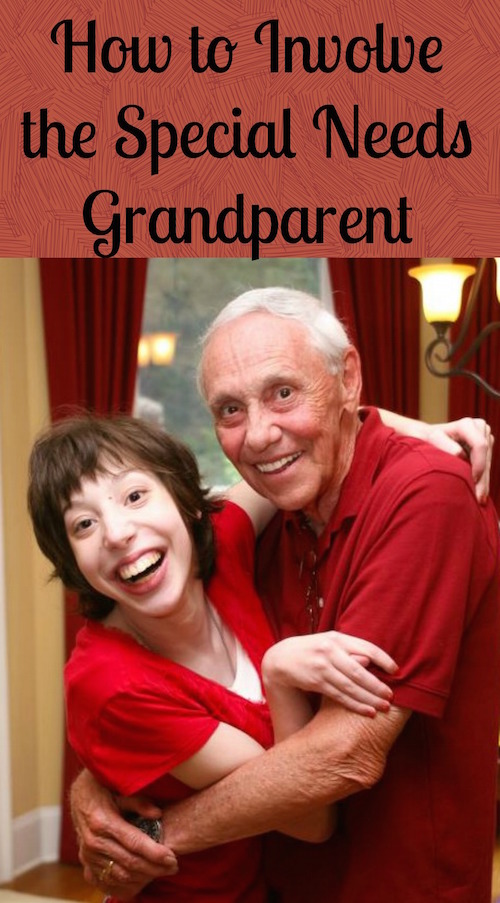Special Needs Grandparents Are Part of the Village

The special needs grandparenting series is back with installment number five. Today, Different Dream is happy to welcome guest blogger Kerith Stull. She previously blogged about 12 Things Special Needs Parents Need to Do. In this post she shares what she’s learned about how to involve special needs grandparents in the lives of their grandkids who have disabilities or other conditions.
Special Needs Grandparents Are Part of the Village
The saying “It takes a village to raise a child” is even more poignant when raising special needs children. The needs of our children as well as our needs can be so much greater. That’s certainly been our experience over the years as we’ve raised our two daughters, now ages 21 and 19.
Grandparents can add so much to your special needs child’s experience.
- They understand you and your story.
- They are fully invested in you and your child.
- They can simply love on your child.
- They can spoil your child.
- They can give you some respite.
How to Help Special Needs Grandparents
- Let them grieve, too. They need space to grieve for the loss of the “typical” grandparenting experience and for watching their own child (you) go through the pain of being a special needs parent. Don’t underestimate their pain.
- Understand their perspective may be very different based on the decade and culture they grew up in. Simply put, times have changed, but maybe they haven’t had a chance to catch up. Give them a chance to learn and shift their thinking. Be patient and give them a little extra forgiveness.
- Involve them in your family’s everyday life, not just the special need child’s life. Share the other details of your lives because there is more to life than your special needs child.
- Make sure they understand your child’s diagnosis and needs. They may need to read about it, hear about, and talk about it many times. Give them plenty of time to digest that information.
- Give them the tools they need to care for your child. This means the knowledge, skills, and equipment. Teach them and let them practice. Perhaps you should have some duplicate equipment at their house as well as toys and feeding items.
- Accept their offers of help, even if it isn’t quite what you need. If you continually turn their offers away, they will probably stop offering. And ask for the specific help you need and want!
- Let them do it their way. Assuming it doesn’t put your child at risk, differences in care giving and interacting with your child are ok and may even benefit your child.
- Bring them to events (therapy, doctor appointments, activities, school events, IEP meetings, etc.). Experiencing all of what you experience will really provide them with insights into your lives.
- Encourage them to spend individual time with your other children. Encourage them to talk to your other children about their sibling experiences. Your other children might need an understanding ear to share worries, frustrations, and questions.
- Encourage the special needs grandparents to talk with their friends about their experiences with your children. They need support from their friends, too.
If the Special Needs Grandparents Live Far Away
We’ve never lived closer than over three hours away from our kids’ grandparents since the first years of our marriage (25 years ago). We’ve done the best we could over the years to keep them connected to our children, but it’s certainly been a challenge. My parents recently moved to our area and it has been the start of a whole new life for all of us. Connecting when special needs grandparents who live far away can be a challenge, but here are some ideas:
- Exchange letters, drawings, or art by snail mail. My parents did this almost weekly when they lived far away.
- Send photographs often (by email or mail). Doesn’t everyone love to see candid pictures?
- Talk using the speaker phone. That way, you can help them connect in a way your child can understand.
- Use video chatting. Don’t wait for a special event. Video chat just for the fun of it! Try doing it at activities so they can see your child in action.
- Videotape the special needs grandparents telling stories or reading books and share them with your child often. My girls loved when my mother did this and it is now a precious heirloom they might be able to show their children.
- Visit in person when possible. You might find that meeting somewhere halfway between where you live for vacation might make it more convenient and affordable.
- Lean on them by sharing details of your life. They will always be your parents and would probably love to be there just to support you.
- Ask them to point out developmental changes when they do see your child. It always surprised me when they pointed out big changes in our special needs daughter in between visits. It might just be the encouragement you need to hear.
If There Aren’t Any Special Needs Grandparents
Grandparents may be missing from your child’s life because of death or relationship strife. Here are some ideas to still include them and find a surrogate grandparent:
- Share stories, photographs, and video of the special needs grandparents, even if they never met your child. We lost my husband’s mother in 2001 when our youngest was only five years old. We aren’t sure what she remembers about her grandmother. We often watch home videos and have many pictures of her in our digital picture frame.
- We continue to talk about her and remind them of how much she loved them.
- Find grandparent figures for your child at church, in the community, or through other connections. They don’t have to be old!
- If the special needs grandparents don’t want to be involved, let it go. I realize this is easier said than done. However, there are some things you can change and this might not be one of them.
Final Thought: The Dollar and Cents of Special Needs Grandparents
Helping your family financially might be something your parents offer to do for you. They may offer regular financial help, one time gifts, or a special fund outlined in their wills. Make sure you and the special needs grandparents understand the consequences of financial gifts to you and your special needs child. Be sure that “gift” doesn’t prevent your child from getting government funding. You may want to consult an accountant, lawyer, or financial planner.
How do YOU involve the special needs grandparents with your child? Leave a comment!
Part 1: Different Dream’s Special Needs Grandparenting Series Begins
Part 2: Special Needs Grandparenting 101
Part 3: Special Needs Grandparenting–The First Word Is Never the Last Word
Part 4: The Special Needs Grandparenting Tug of War
Part 5: Special Needs Grandparents Are Part of the Village
Part 6: What’s It Like to Be a Special Needs Grandparent?
Part 7: From a Special Needs Grandpa
Do you like what you see at DifferentDream.com? You can receive more great content by subscribing to the quarterly Different Dream newsletter and signing up for the daily RSS feed delivered to your email inbox. You can sign up for the first in the pop up box and the second at the bottom of this page.

By Kerith Stull
Kerith Stull earned a Master’s Degree in communication and worked in marketing before becoming a stay-at-home mother when her children were little. She has been married to her high school sweetheart for the last 24 years and is a recent semi-empty-nester since her 20-year-old daughter moved out to go to college. Kerith blogs about special needs parenting issues at Brielle and Me with her uniquely positive perspective. You can also find her on Facebook, Twitter, and Pinterest. She recently published a book, Brielle and Me: Our Journey with Cytomegalovirus and Cerebral Palsy, about her experiences with their 18-year-old special needs daughter and their family’s journey of hope, determination, love, and faith.
Subscribe for Updates from Jolene
Related Posts
My Favorite Vacation Planning Tips for Special Needs Families
Are you traveling this summer? Jolene provides her favorite vacation planning tips for special needs families.
The Weight of Silence as Parents of Kids with Invisible Disabilities
Guest blogger Lisa Pelissier explains the weight of silence as parents of kids with invisible disabilities.
How to Build a Thriving Marriage as You Care for Children with Special Needs
Todd and Kristin Evans explain how to build a thriving marriage as you care for children with special needs.






0 Comments